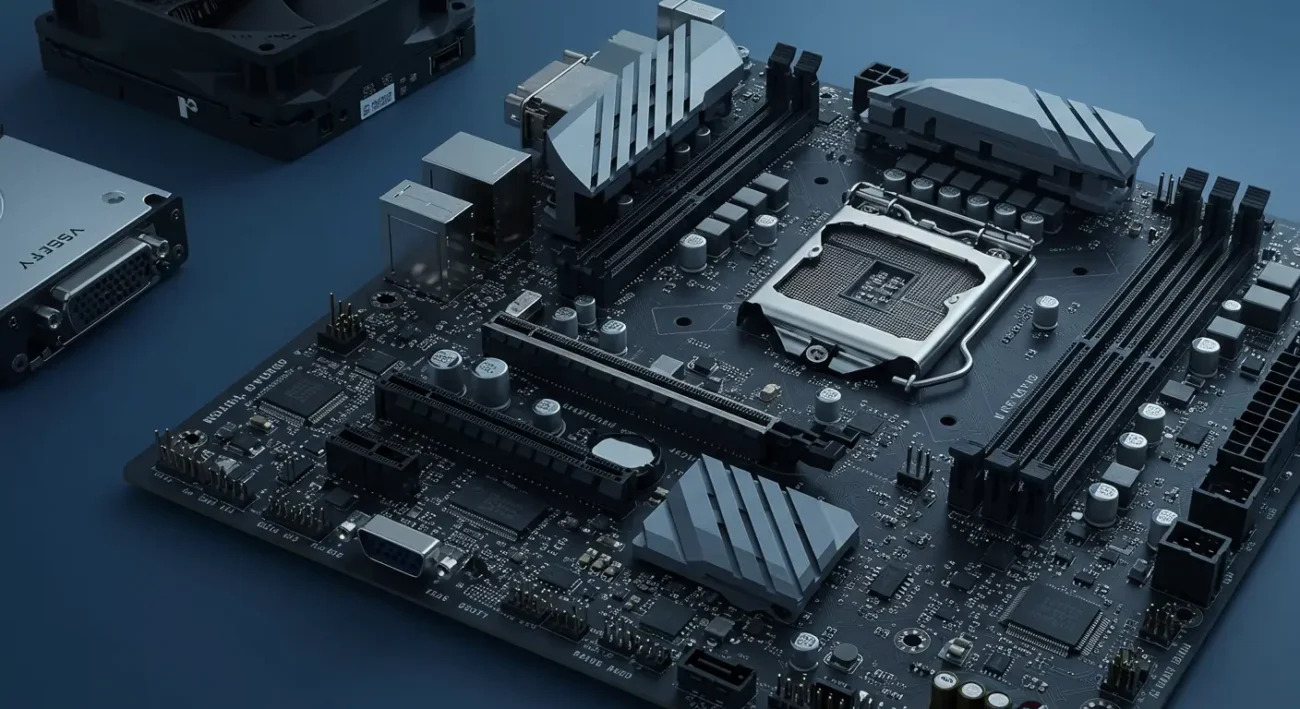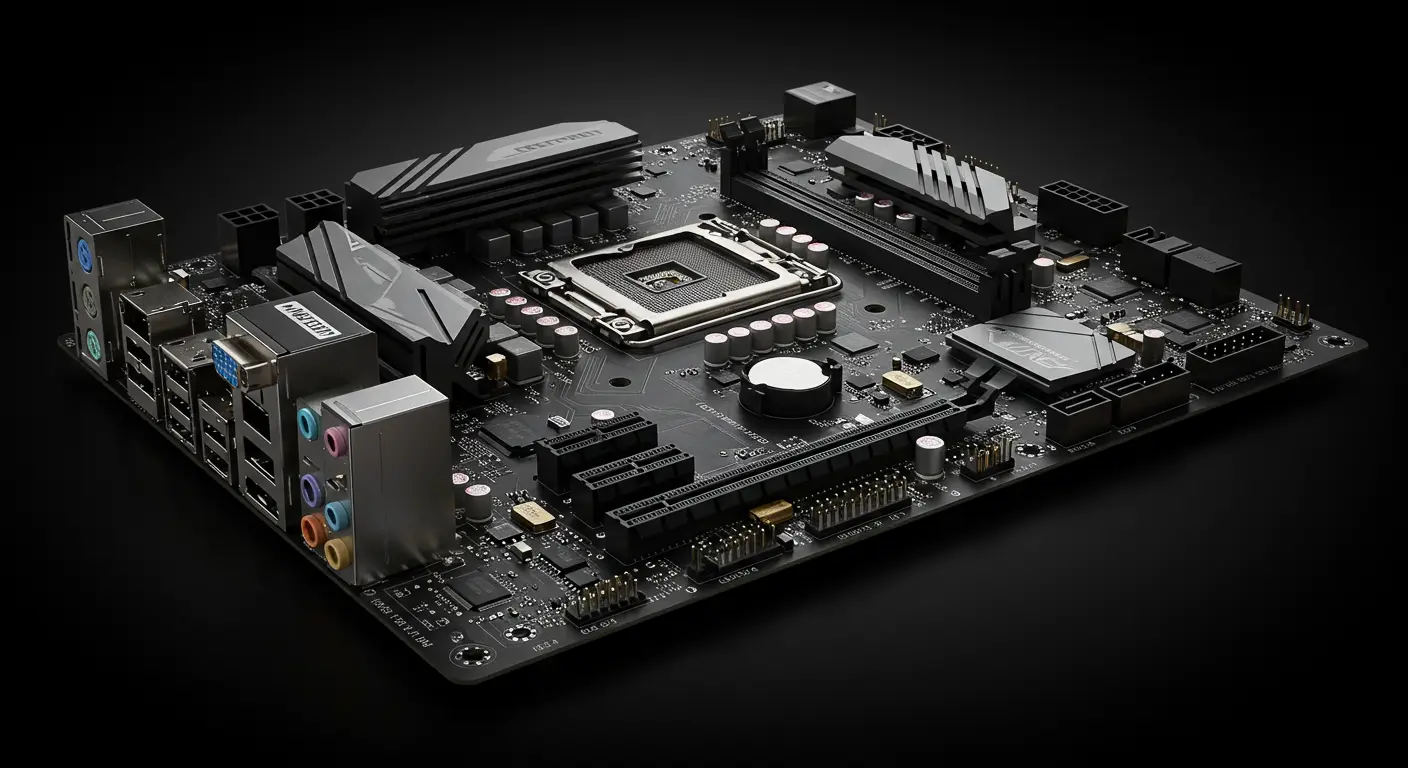When it comes to building a PC, the motherboard is one of the most important components. It’s the backbone that connects all your hardware and ensures everything works seamlessly together. While gaming PCs often take the spotlight, a non-gaming PC can also benefit from a high quality motherboard, especially if you’re looking for a solid performance in everyday tasks like web browsing, media consumption, and office work.
We’ll dive into the best motherboards for non gaming PCs. Whether you’re looking for something cost effective, reliable, or feature packed, we’ve got you covered. We’ll also compare different motherboards based on key factors, so you can make an informed decision for your build.
What to Look for in a Motherboard for a Non Gaming PC

When building a PC for gaming purposes, your priorities may differ from those of a gamer. Instead of seeking top-tier graphics performance, you’ll likely want stability, value for money, and a motherboard that offers the right mix of features for everyday use.
Form Factor
Motherboards come in several sizes, but for non-gaming PCs, you’ll likely be looking at either ATX, microATX, or mini-ITX. ATX motherboards are the most common and offer more expansion options, while microATX is more compact and can fit into smaller cases. Mini-ITX is the smallest option and is great for ultra-compact builds.
Processor Compatibility
Ensure that the motherboard supports the type of CPU you plan to use. AMD and Intel are the two main CPU manufacturers, and the motherboard will need to have the correct socket type for the processor you choose. For most non-gaming PCs, either a mid-range Intel or AMD processor will do just fine.
RAM Slots and Capacity
You don’t need extreme RAM capacities for a non-gaming PC, but having enough slots for future upgrades is always a good idea. Look for motherboards with at least two RAM slots, which can accommodate 16GB or more of memory for smooth multitasking.
Storage Options
Non-gaming PCs may require multiple storage drives for files, media, and programs. Ensure that your motherboard has sufficient SATA ports and preferably an M.2 slot for fast NVMe SSD storage. This will offer faster boot and load times for your everyday tasks.
USB and Connectivity Ports
USB ports are essential for connecting peripherals such as keyboards, mice, and external storage. A motherboard with a mix of USB 2.0, 3.0, and USB-C ports is ideal. Additionally, modern motherboards come with built-in Wi-Fi, Bluetooth, and Ethernet ports for a variety of connection options.
Top 5 Best Motherboards for Non Gaming PCs
Here’s a list of the top five motherboards that offer great value and performance for non-gaming PCs:
| Motherboard Model | Form Factor | Socket Type | RAM Support | Storage Options | Connectivity |
|---|---|---|---|---|---|
| ASUS Prime B450M-A/CSM | MicroATX | AM4 (AMD Ryzen) | Up to 64GB DDR4 | 4 x SATA, 1 x M.2 | USB 3.1, Wi-Fi Support |
| Gigabyte B460M DS3H | MicroATX | LGA 1200 (Intel Core i3/i5/i7) | Up to 64GB DDR4 | 6 x USB, 1 x HDMI | USB 3.0, HDMI |
| MSI B450-A PRO MAX | ATX | AM4 (AMD Ryzen) | Up to 64GB DDR4 | 6 x SATA, 2 x M.2 | 8+2 VRM, 6 x SATA, 2 x M.2 |
| ASRock H470M-ITX/ac | Mini-ITX | LGA 1200 (Intel) | Up to 64GB DDR4 | 2 x M.2 | Wi-Fi, Bluetooth |
| ASUS TUF B550-PLUS (Wi-Fi 6) | ATX | AM4 (AMD Ryzen) | Up to 128GB DDR4 | 4 x RAM Slots, Wi-Fi 6 | Wi-Fi 6, Bluetooth 5.0 |
ASUS Prime B450M-A/CSM
The ASUS Prime B450M-A/CSM is an affordable and solid choice for those looking to build a non-gaming PC. It offers good performance for everyday computing tasks and comes with essential features like four SATA ports, an M.2 slot, and support for up to 64GB of DDR4 RAM.
- Key Features:
- MicroATX form factor
- AM4 socket for AMD Ryzen processors
- 4 x USB 3.1 ports
- Wi-Fi support (with additional adapter)
- Excellent build quality for the price
Gigabyte B460M DS3H
The Gigabyte B460M DS3H is another budget-friendly motherboard that fits well in non-gaming PCs. It’s based on the Intel B460 chipset and offers support for Intel’s 10th and 11th generation processors. This motherboard is known for its reliability and value, with plenty of connectivity options.
- Key Features:
- MicroATX form factor
- LGA 1200 socket for Intel Core i3/i5/i7 CPUs
- Dual-channel memory support for up to 64GB of DDR4 RAM
- 6 x USB ports and HDMI output for video
MSI B450-A PRO MAX
For those who need more RAM slots and more storage options, the MSI B450-A PRO MAX is an excellent choice. This ATX motherboard supports AMD Ryzen processors and provides plenty of upgrade options.
- Key Features:
- ATX form factor
- AM4 socket for AMD Ryzen processors
- 6 x SATA ports and 2 x M.2 slots
- 8+2 VRM phase for stable performance
ASRock H470M-ITX/ac
For those who want a compact yet feature-rich motherboard, the ASRock H470M-ITX/ac is an excellent choice. Its small size makes it ideal for tight builds, but it doesn’t compromise on features.
- Key Features:
- Mini-ITX form factor
- LGA 1200 socket for Intel CPUs
- Wi-Fi and Bluetooth support
- 2 x M.2 slots for ultra-fast storage
ASUS TUF B550-PLUS (Wi-Fi 6)
If you prefer a more future-proof option with newer tech, the ASUS TUF B550-PLUS (Wi-Fi 6) offers excellent value. With support for AMD Ryzen 5000 series processors and built-in Wi-Fi 6, it’s perfect for anyone who wants a reliable, long-term investment in a non-gaming PC.
- Key Features:
- ATX form factor
- AM4 socket for AMD Ryzen processors
- Wi-Fi 6 and Bluetooth 5.0
- 4 x RAM slots supporting up to 128GB of DDR4 RAM
Factors to Consider Before Buying a Motherboard
When selecting a motherboard for your non gaming PC, there are several factors to consider:
Budget
Motherboards range from affordable to expensive. If you’re building a non gaming PC, you likely don’t need top-tier features. A motherboard in the $50 to $150 range will typically meet your needs.
Future Proofing
Even if you don’t need the highest specs right now, consider a motherboard that will allow you to upgrade in the future. Look for features like multiple RAM slots, M.2 support, and PCIe 4.0 to ensure your PC stays relevant for years.
Reliability and Build Quality
Look for motherboards from reputable brands like ASUS, MSI, Gigabyte, and ASRock. These companies have a history of producing reliable and well-built motherboards.
Expansion Options
Think about how many USB ports, RAM slots, and storage devices you might need now or in the future. A motherboard with more expansion options will make it easier to upgrade your PC later.
FAQs
What is the best motherboard for general use?
For general use, the ASUS Prime B450M-A is a great choice due to its balance of features and price. It’s perfect for everyday computing tasks and can handle future upgrades.
Can I use a gaming motherboard for a non-gaming PC?
Yes, you can. A gaming motherboard usually offers more features like enhanced cooling and better RAM support. However, you might not need these features if you’re building a non-gaming PC.
What motherboard is good for video editing?
If you’re into video editing, the ASUS TUF B550-PLUS is a solid option. It offers great connectivity, RAM support, and overall performance, which is ideal for tasks like video editing.
How much RAM do I need for a non-gaming PC?
For basic computing, 8GB of RAM is sufficient. However, for multitasking or media editing, 16GB is recommended.
Conclusion
Choosing the best motherboard for a non-gaming PC doesn’t have to be complicated. Focus on what’s important for your daily tasks, like stability, storage options, and connectivity. By considering the options listed here and following the factors outlined in this guide, you’ll be able to find the perfect motherboard for your build. Remember, the goal is to find a balance between price and performance while also ensuring room for future upgrades.

